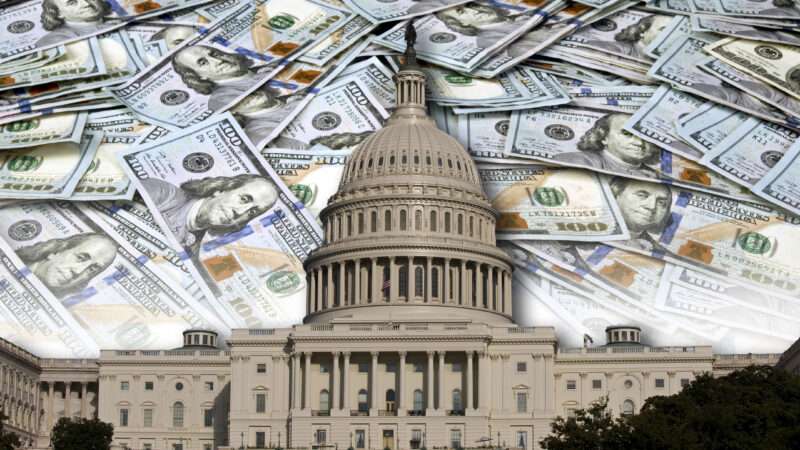
There were many reasons I left New York a quarter of a century ago, and taxes were just one among them. But along with less-restrictive laws and improved scenery, my move to Arizona rewarded me with substantially less banditry by state and local authorities. Still, I’d like an even lower tax bill, and so would most people. With Tax Day fast approaching, Americans consistently say they pay too much for government that isn’t worth the money.
Too Big a Take
“About two-thirds of people consider their federal income tax (67%), state sales tax (62%), and local property tax (69%) to be too high,” the AP-NORC Center for Public Affairs Research reported in January.
My old neighbors in the Empire State have the most to complain about, with state and local taxes devouring an average of 15.9 percent of income in addition to what they pay the federal government, according to the Tax Foundation. By comparison, in Arizona where I now live, residents pay an average of 9.5 percent of income to the state and localities. Alaskans fork over the least at 4.6 percent in addition to the federal share.
The government’s reach into our pockets can add up quickly. At the federal level, according to the latest data, the average income tax rate in 2021 was 14.9 percent, up from 13.6 percent in 2020, and 13.29 percent in 2019. Add that to the state and local take and that’s a big chunk of money out of the family budget. That said, average rates cover wide disparities in the amounts for which people are mugged by tax collectors.
“The top 1 percent of taxpayers paid a 25.9 percent average rate, nearly eight times higher than the 3.3 percent average rate paid by the bottom half of taxpayers,” according to the Tax Foundation, with reference to the federal income tax.
Why do Americans resent the tax burden? Well, there’s the fact that taxes are compulsory payments in amounts over which they have little say. That’s a big deal bound to breed resentment. Adding insult to injury is that many people are not happy about what they get in return for those forced expenditures.
“About a third of adults say they are receiving poor value from the taxes they pay, while less than a quarter believe they receive good value from paying these taxes,” adds AP-NORC. “Most people lack confidence in the way taxes are spent by the federal government (66%) or state governments (58%). People are more likely to express at least some confidence in local governments (49%) or local school districts (53%) to spend their tax dollars wisely.”
Last year, Gallup found similar results, with 60 percent of those surveyed saying federal income taxes are too high—”a level last seen in 2001.” Thirty-four percent of adults called federal income tax the least fair tax, followed by local property tax at 29 percent, with state income tax, state sales tax, and Social Security tax named by between 10 and 14 percent of respondents.
Partisan Divide on Taxes
As with all things American in 2024, there is a partisan component to opinions about taxes.
“Democrats are more likely than Republicans to see taxes as fair, and Republicans are more likely to say their taxes are too high,” notes AP-NORC.
“Republicans (71%) are now sharply more likely to believe their taxes are too high,” agreed Gallup, as compared to 41 percent of Democrats and 62 percent of independents.
Much of this difference of opinion is undoubtedly the natural ideological contrast between parties that traditionally differ over the role of government, as AP-NORC points out.
“Democrats generally trust the government to spend tax money for the benefit of people like them and are open to higher taxes for more services. In contrast, Republicans are more skeptical of government spending, expressing a preference for lower taxes with fewer services.”
But Gallup notes that only 46 percent of Republicans said the federal income tax was too high in 2020 when Donald Trump was president, compared to the 71 percent under Joe Biden. That may indicate higher tolerance for being milked by their side than by the opposition (the belief that federal income tax is too high increased one point among Democrats over that time, and 14 points among independents).
Of course, not all government activities are the same. Money spent on fighter jets isn’t interchangeable with subsidies for green industries. It’s not surprising that people more sharply resent being forced to pay for programs and policies they oppose than those they favor. When people say they get “poor value” for their taxes, they may mean not just inefficiency and bureaucracy, but things they consider wrong.
Borrowing To Deliver Poor Value
Worse, we actually get far more federal government than we’re paying for. That’s because so much federal spending is financed by deficits and debt—borrowing—that will have to be paid at some point in the future by taxpayers who are unlikely to be happy about the burden of paying overdue bills.
“The United States borrowed $ 1.1 trillion in the first six months of fiscal year 2024, including $ 236 billion in March,” the Committee for a Responsible Federal Budget warned this week.
Total national debt is over $ 34 trillion, with debt held by the public (excluding money the government owes itself) more than $ 27 trillion. The second figure—the more worrisome of the two—is close to 100 percent of GDP. The Congressional Budget Office sees debt held by the public continuously rising in years to come resulting in “significant risks to the fiscal and economic outlook.”
It costs a lot to deliver government of “poor value.” You have to wonder if people might be happier to keep their money so they can purchase services of their own choosing instead of coughing it up to be spent by officials in whom they “lack confidence.” If taxpayers lack faith in those who forcibly extract their hard-earned cash and still can’t balance the books, it makes sense to try something different.
There’s an example to be found in how much more satisfaction I find in Arizona, where my state and local tax take is roughly two-thirds of what my old neighbors pay in New York. I don’t miss any of the services my former home state provides—to the contrary, I opposed many of the policies my money paid for and the laws it was used to enforce.
I still think my taxes are too high and resent some of the uses to which it’s put. The polling suggests I’m in good company in believing government takes too much and isn’t worth the expense.
The post Poll: Americans Don't Think All This Government Is Worth What We Pay for It appeared first on Reason.com.
View Article Here Taxes | Reason Archives










